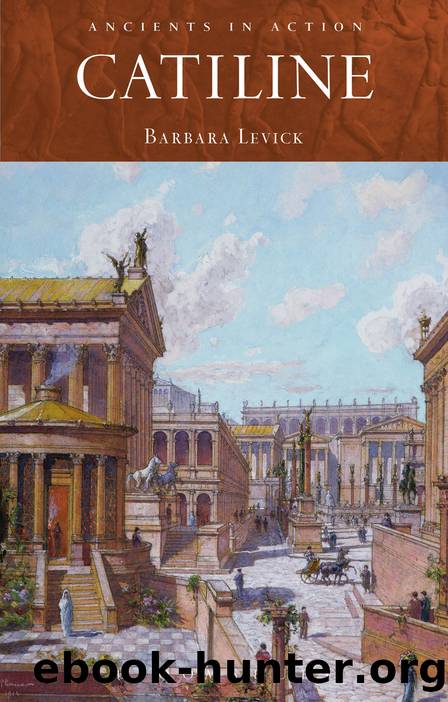Catiline by Barbara Levick

Author:Barbara Levick
Language: eng
Format: epub
Publisher: Bloomsbury Publishing Plc
Published: 2015-02-14T16:00:00+00:00
Exile or rebel?
When Catiline went north, he made as if he were going into exile at Massilia (Marseille) a free city of Greek foundation, and always a favourite with exiles (C. Verres was already there). On the route he dispatched messages to a large number of men of consular rank and others of high standing. He claimed that it was false accusations that had brought him down. He was yielding to the inevitable and going to exile. He had no sense of guilt, but wanted the state to be at peace, with no unrest arising on his account. On the other hand his personal and longstanding friend, Q. Catulus, read a letter out in the Senate which was more revealing:
Your extraordinary loyalty to me, which I know from experience, is welcome to me in my grave dangers and gives me confidence in commending myself to you. For that reason I have taken a fresh course of action and decided not to prepare a defence. It is not from any sense of guilt that I am offering an explanation; heaven knows you are aware of the truth of it. I have been stung by wrongs and insults and, deprived of the fruit of my toil and hard work, was not winning the position that belonged to my rank; so I have done as I have often done before, taken up the cause of the deprived wherever they are. It is not that I couldnât pay off my own debts from my own property (and the generosity of Orestilla would pay off with her own and her daughterâs money debts that have been incurred through others); but I have seen unworthy men raised to honour and office, while I felt myself become an outcast through unfounded suspicion. It is on this account that I have taken up hopes, honourable enough in my circumstances, of preserving what remains of my dignity. I should like to write more, but news has come that violence is to be used against me. Now I commend Orestilla to you and entrust her to your loyalty. See that you protect her from insult, in the name of your children.
Whatever Catiline wrote to other senators, he and his train of 300 (armed, of course, and including his friend Tongillus) were prepared for other goals than exile. They were carrying symbols of Roman authority, rods and axes, fully deployed as the insignia of a consul on arrival at Faesulae. Figures of the number of men involved differ from one author to another (and when the number of men killed in battle are concerned, fluctuations are particularly wild). A force of 2,000 men, half of them fully armed, was probably what Catiline found when he reached Etruria. His efforts and present charisma were enough to raise them to 12,000 (two legionsâ worth, a quarter armed), though their maximum conjectured strength was 20,000 men, a quarter fully armed (so Appian). When the final battle came, after the executions at Rome, they may well have fallen to 3,000.
Download
This site does not store any files on its server. We only index and link to content provided by other sites. Please contact the content providers to delete copyright contents if any and email us, we'll remove relevant links or contents immediately.
| Africa | Americas |
| Arctic & Antarctica | Asia |
| Australia & Oceania | Europe |
| Middle East | Russia |
| United States | World |
| Ancient Civilizations | Military |
| Historical Study & Educational Resources |
Magic and Divination in Early Islam by Emilie Savage-Smith;(1529)
Papillon by Henry Charrière(1408)
Bohemians, Bootleggers, Flappers, and Swells: The Best of Early Vanity Fair by Bohemians Bootleggers Flappers & Swells- The Best of Early Vanity Fair (epub)(1394)
Ambition and Desire: The Dangerous Life of Josephine Bonaparte by Kate Williams(1379)
Twelve Caesars by Mary Beard(1309)
Operation Vengeance: The Astonishing Aerial Ambush That Changed World War II by Dan Hampton(1155)
What Really Happened: The Death of Hitler by Robert J. Hutchinson(1151)
London in the Twentieth Century by Jerry White(1137)
The Japanese by Christopher Harding(1128)
Time of the Magicians by Wolfram Eilenberger(1118)
Twilight of the Gods by Ian W. Toll(1110)
Lenin: A Biography by Robert Service(1069)
The Devil You Know by Charles M. Blow(1017)
A Social History of the Media by Peter Burke & Peter Burke(964)
Freemasons for Dummies by Hodapp Christopher;(956)
Napolean Hill Collection by Napoleon Hill(936)
Henry III by David Carpenter;(915)
The Rise and Triumph of the Modern Self by Unknown(903)
The Churchill Complex by Ian Buruma(901)
